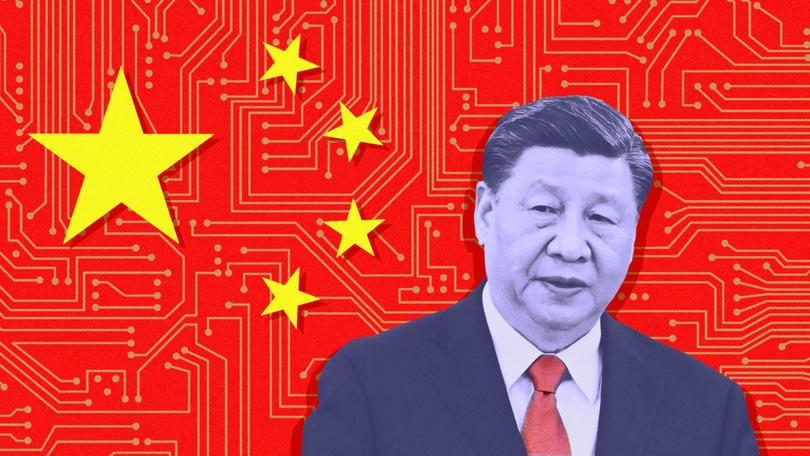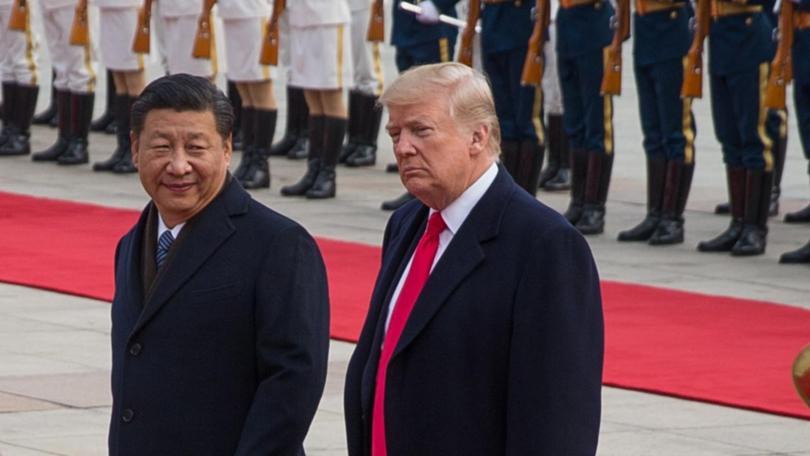From export controls to hacks, China signals it’s ready to take on Trump
Beijing has in recent weeks broadcast that — unlike during Donald Trump’s first term — it is prepared to confront him as president head-on.

With a burst of diplomatic and military moves, threats to restrict key exports and devastating cyberattacks on American networks, Beijing has in recent weeks broadcast that, unlike during Donald Trump’s first term, it is prepared to confront him as president head-on.
Since the US election, China has revealed an extensive playbook of aggressive retaliatory trade measures to enact if Trump imposes additional tariffs of 10 to 60 percent on Chinese goods imported into the United States.
After a ban on exports to the United States of several key raw materials in December, Chinese authorities last week proposed expanded export restrictions on technologies for processing critical minerals used in batteries for electric vehicles — a sector where it dominates global supply.
Sign up to The Nightly's newsletters.
Get the first look at the digital newspaper, curated daily stories and breaking headlines delivered to your inbox.
By continuing you agree to our Terms and Privacy Policy.At the same time, Beijing is already working to exploit cracks in American power that may arise from Trump’s unpredictable foreign policy.
It has showcased advanced weaponry, strengthened outreach to developing countries and reconciled with US security partners in the Asia-Pacific, while multiple successful cyberattacks on the United States have demonstrated the increased sophistication of its state-backed hackers.
In isolation, each development fits within China’s long-running efforts to gain an edge over the United States in a global contest for influence.
Together, the flurry of activity reveals how Beijing is prepared to act swiftly and forcefully in an intensified diplomatic and trade standoff with Trump, analysts said.
“The suppression of China under Trump 1.0 made China give up its fantasies about the United States and strengthened Chinese unity,” said Wang Wen, dean of the Chongyang Institute at Renmin University in Beijing. Beijing should view Trump’s return as a “magic weapon” to urge on its technology drive and outreach to international partners, Wang added.
“For China, the trade war is only a fraction of the greater strategic landscape of competition with the United States, and Trump is only one period of that competition,” said Yun Sun, director of the China program at the Stimson Center, a think tank. “The long game is how to gain the strategic upper hand.”
China is taking this hard-line stance as the US Senate prepares to hold key confirmation hearings that will shape US-China relations in the next Trump administration.
These include China hawk Marco Rubio, the nominee for secretary of state, who has been placed under sanctions by Beijing; Elise Stefanik, expected to become U.S. ambassador to the United Nations; and Pete Hegseth, Trump’s pick to lead the Pentagon.
Beijing has not sat idle in its search for an advantage. The Chinese military ended 2024 with the surprise unveiling of two sixth-generation fighter jet prototypes, weeks after it sent a record number of warships into waters around the self-governed island democracy of Taiwan, which Beijing claims as its own.
Last week, China welcomed Indonesia to the BRICS bloc, a gathering of developing nations Beijing hopes will help it reshape the global order in its favor. Last month, it made headway thawing tensions with Japan, a key member of the Trump-revived Quad security partnership.
And all of this happened as US officials revealed details of Chinese state-sponsored cyberattacks on critical infrastructure, cellphone networks and the Treasury Department in recent months. Beijing has said it was not responsible for the intrusions.
Even as it projects strength, China has kept the door open to a potential deal to avert a trade war.
Its Foreign Ministry said last week that it “attaches great importance” to Trump’s prediction on a conservative talk show that he would “get on very well” with Chinese leader Xi Jinping so long as the relationship was a “two-way street.”
“Beijing is keeping its powder dry as it waits to see how hard and fast Trump moves against China after his inauguration,” said Neil Thomas, an expert on Chinese politics at the Asia Society Policy Institute, a think tank.

Still, the Trump foreign policy team is set to be dominated by strident China hawks, and the steady drumbeat of announcements about Chinese hacks in the United States has set up a tense start to relations after Jan. 20.
Although they have been active for decades, Chinese hacking groups now appear to be “crescendoing into probably the best period of Chinese hacking capabilities that we’ve seen,” said Dakota Cary, a China expert at cybersecurity firm SentinelOne.
The range of targets illustrates how China’s cyber operations are evolving, moving beyond obvious commercial or military targets, which makes it harder to identify and repel intrusions. In one attack, for example, Chinese state-linked groups used hundreds of thousands of routers and other internet-connected devices to spy on sensitive organizations.
The Trump administration is “going to have to confront that head-on,” Cary said.
Beijing’s bold stance this time is a stark departure from Trump’s first term. Then, Xi responded cautiously, courting Trump with an exclusive tour of Beijing’s Forbidden City and bromides about the importance of “mutual respect.”
Even after Trump imposed sweeping tariffs on Chinese goods, the Chinese government avoided targeting American businesses or cutting off exports of critical minerals, focusing instead on negotiating an agreement, which was eventually struck in January 2020.
Between then and now, Xi has cemented his grip on the Chinese Communist Party and honed tools of economic pressure against the United States. He has called for Chinese companies to insulate from external shocks by focusing on “domestic circulation” and relying less on American buyers.
“After dealing with Trump for four years, China has a better understanding of him,” said Ren Xiao, a former Chinese diplomat and a professor of international politics at Fudan University in Shanghai. “We are more confident and prepared.”
China’s revised strategy is in part informed by Beijing’s frustration with a consistently tense relationship with the United States since Trump left office.
In his final meeting with President Joe Biden, Xi set out the limits of his tolerance for Trump when he laid down four “red lines” that the United States must not cross if it wants to avoid reprisals.
Alongside long-standing complaints about Taiwan, human rights and the Chinese political system, Xi underscored that the Chinese people’s “right to development” was now considered a core interest that must not be challenged.
That right is “inalienable and cannot be ignored,” the Chinese Foreign Ministry said Tuesday when it urged the Pentagon to reverse a decision to blacklist China’s largest tech firm and EV battery manufacturer. “China will take all measures necessary to firmly defend” its companies, a spokesperson said.
Beijing’s bravado doesn’t always match reality, however.
China’s economy is still weighed down by weak consumer confidence, a prolonged property slump and a flirtation with deflation. Even after a $1.4 trillion stimulus late last year, many economists forecast that gross domestic product for 2024 will come out below a target of 5 percent growth.
Xi’s military and diplomatic agenda also faces serious obstacles. A corruption scandal that brought down two defense ministers and the military’s top political commissar may have delayed an ambitious modernization agenda, the Pentagon said in December.
Tensions with Japan remain high over disputed islands in the East China Sea. A recent détente with New Delhi is already being tested by Chinese plans to build a massive dam in Tibet upriver from India.
However, China is ready to “take advantage of U.S. allies’ general lack of trust [in Trump] and potential frictions … to balance out American influence,” said Qiu Huafei, a professor at Tongji University in Shanghai.
That is especially true for Taiwan, which Beijing often calls the “core of its core interests,” where Qiu predicts more sanctions targeting American individuals and companies that sell arms to Taipei. “It may cause some economic losses for China, but that’s a price worth paying to convey China’s tough stance,” he said.
© 2025 , The Washington Post
